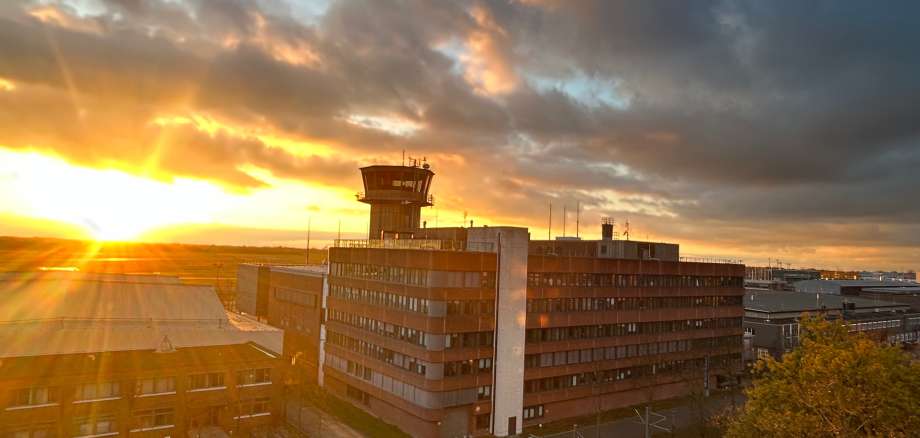The air traffic controllers at the DFS radar control centre in Bremen have been guiding aircraft safely through their airspace for 50 years. This area covers around 180,000 square kilometres of lower airspace up to an altitude of 8,500 metres, equivalent to half the area of Germany. In this airspace, the controllers of DFS, the German air navigation service provider, handle up to 1,800 aircraft a day. Bremen's mayor, Dr Andreas Bovenschulte, visited the DFS branch to mark the anniversary and thanked the approximately 500 employees for their diligent work.
"Thanks from the people flying thousands of metres up in the sky"
"DFS employees have been ensuring safety in the airspace over northern Germany for 50 years. For their skilled, hard work, they deserve the thanks of the people flying thousands of metres up in the sky, and those closer to the ground. It is reassuring to know that safety in German airspace is in good hands," said Dr Bovenschulte, thanking the staff of the DFS Bremen branch, which is based at Bremen Airport.
On 6 April 1974, the Bremen regional office of the then German Federal Administration of Air Navigation Services (BFS) started operations using the radio call sign Bremen Radar. The background to this was the decision to integrate the regional military air traffic services units in Rastede-Loy and Husum. As the Hannover area control centre was too small for this, a new operations building was needed. A plot of land owned by the German Federal Government was identified at Bremen Airport, on which the new regional unit was established.
"40 percent of military training flights are handled by DFS in Bremen"
The Bremen controllers initially controlled the airspace over the western part of Lower Saxony and the German Bight as well as the approaches to Bremen Airport. On 1 November 1974, the working positions for the airspace over the southern and north-eastern parts of Lower Saxony and southern Schleswig-Holstein as well as the flight information service for general aviation were also transferred from Hannover to Bremen. Following the decision of DFS to consolidate the number of its control centres from six to four, Bremen was chosen for airspace surveillance over northern and parts of eastern Germany. In December 2006, almost 140 DFS staff from Berlin joined the 350 DFS personnel in Bremen. The airspace of the Bremen branch thus expanded eastwards to the Polish border.
"In its 50 years, the Bremen control centre has helped to write important chapters in the history of German air navigation services," emphasised Arndt Schoenemann, CEO of DFS. "The local integration of military en-route control developed into civil-military integration for the entire German airspace. This type of cooperation is unique in the world," said Schoenemann. "Today, around 40 percent of all military training flights in Germany are handled by DFS in Bremen alone. The fact that we have acquired extensive military expertise is demonstrated not least by the seamless handling of the large-scale Air Defender 2023 exercise."
"Pragmatically, reliably and highly professionally"
Prior to reunification, the Bremen controllers guided aircraft bound for Berlin Tempelhof or Berlin Tegel via two airspace corridors through the airspace of the former German Democratic Republic (GDR). Years later, the DFS branch in Bremen developed the flight procedures for the new Berlin Brandenburg Airport (BER), which opened in October 2020. In 2012, Bremen Airport was the scene of a world premiere when the first aircraft landed after a precision approach using the GBAS satellite-based landing system. This was later followed by the first satellite-based precision approach without the use of any ground-based navigation infrastructure.
Bremen's air traffic controllers coped with the increasing volume of air traffic – from 200,000 aircraft movements in 1974 to over 480,000 in 2023. They did this by constantly adapting flight procedures and airspace organisation, and by using new, innovative support technology. Describing his team, Andre Biestmann, Director Operations in Bremen, said: "Our staff rise to challenges and overcome them in a relaxed, North German manner: pragmatically, reliably and highly professionally." In 2008, for example, the branch was the first location to replace paper flight progress strips with modern touch displays. Since then, all flight data has been managed in digital form. In 2028, a new era of air traffic control will begin with the switch to the iCAS air traffic control system based on 4D trajectories. Preparations for this are already underway.
Media contact:
Anja Naumann
Telephone +49 (0)421) 5372-116
E-mail: presse@dfs.de
DFS Deutsche Flugsicherung GmbH (DFS), the German air navigation service provider, is a State-owned company under private law with 5,700 employees as at 31 December 2023. DFS ensures the safe and punctual flow of air traffic over Germany. Around 2,200 air traffic controllers guide more than three million flights through German airspace in peak years, up to 10,000 every day. The company operates control centres in Bremen, Karlsruhe, Langen and Munich as well as control towers at the 15 designated international airports in Germany. The subsidiary, DFS Aviation Services GmbH, markets and sells products and services related to air navigation services, and provides air traffic control at nine regional airports in Germany and at Edinburgh Airport in the United Kingdom. DFS is working on the integration of drones into air traffic and has set up a joint venture, Droniq GmbH, with Deutsche Telekom. Other subsidiaries include R. Eisenschmidt GmbH, which markets publications and products for general aviation, and Kaufbeuren ATM Training GmbH (KAT), which provides training for military air traffic services personnel. The joint venture FCS Flight Calibration Services GmbH offers flight inspection services. www.dfs.de
